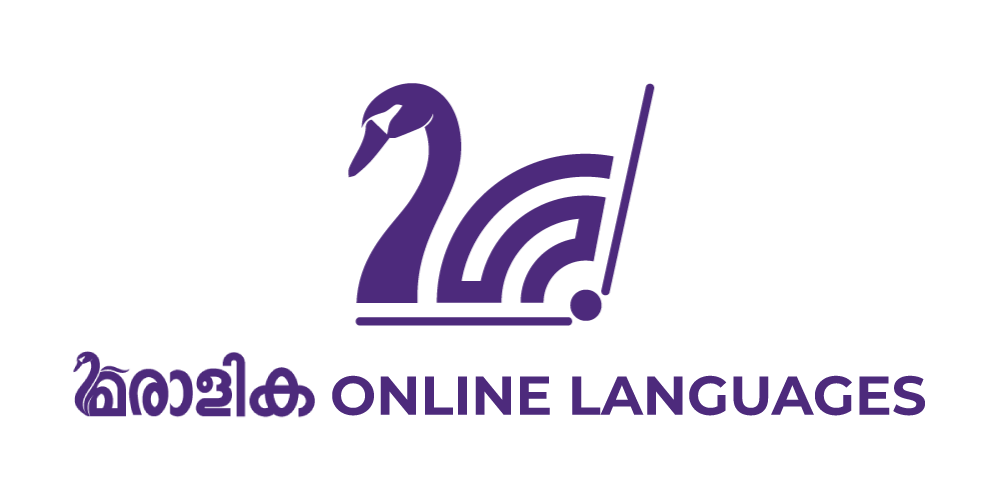While it is always good to learn a language step by step, stating from alphabets, learning correct pronunciation, and understanding the depth and nuances of grammar. But even if we learn it systematically and we can read and understand the language pretty well, conversation can be a challenge, because there are some differences between formal language and conversational form of language.
It will be very helpful to learn and memorize some of the most frequently used words and phrases in everyday conversations. It can improve confidence and communication. There are numerous words and sentences that we use in our daily conversation. Some of these are very important, special and easy to remember because of its repeated use. Greeting or addressing others, to thank, agree and disagree, expressing gratitude and saying sorry, conveying goodwill and blessings, ask for help, are some of the situations that will be recurring in our daily lives. Regardless of whether it is a formal or informal conversation, to have an idea how to respond in these situations, what can be said during these situations will be beneficial and great support to start or take part in it.

LET US LEARN SOME MOST COMMON AND USEFUL MALAYALAM WORDS AND SENTENCES
- നമസ്കാരം NAMASKĀRAM
- നമോവാകം NAMŌVĀKAM
- നമസ്തേ NAMASTE
- കൂപ്പുകൈ KŪPPUKAI
These are similar to words like Hello, Hi in English language. Formally, this word is said with palms joint together. Informal or the friendly version for this can be heard as നമസ്കാരം ട്ടോ, നമസ്കാരമുണ്ട് Namaskaram tto, Namaskaram undu like are more common among friends and colleagues.
- സ്വാഗതം – SWĀGATAM Meaning of this word is, WELCOME in English language. This is a formal word used in a meeting or in a speech or in front of shops and establishments etc.
- വരൂ – VARŪ
- അകത്തേക്ക് വരൂ – AKATHĒKKU VARŪ
- അകത്ത് വരൂ – AKATHU VARŪ
- കയറി വരൂ – KAYARI VARŪ
- അകത്ത് വരാമല്ലോ – AKATHU VARĀMALLO
These are words used in Malayalam to welcome someone into our home. All these words are similar to COME ON, COME IN, COME INSIDE etc. in English language. All these are gentle, sweet, friendly as well as polite.
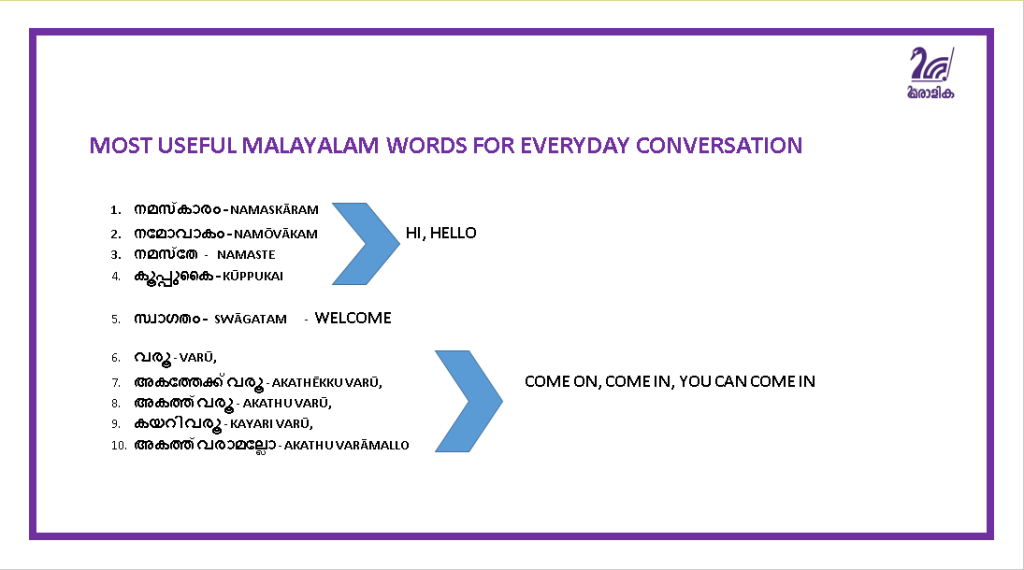
- എന്തൊക്കെയുണ്ട് വിശേഷം? – ENTHOKKE UNDU VISHĒSHAM?
- എന്തൊക്കെയുണ്ട്? – ENTHOKKE UŅDU?
- സുഖം തന്നെ അല്ലെ? – SUKHAM THANNE ALLE?
- എന്ത് പറയുന്നു? – ENTHU PARAYUNNU? These words are similar to HOW ARE YOU? HOW DO YOU DO?, in English language. Generally the speaker is asking about how the life is going on, or how are you nowadays etc.
So we can answer as below
- നന്നായിരിക്കുന്നു – NANNĀYIRIKKUNNU
- വിശേഷിച്ച് ഒന്നുമില്ല – VISHĒSHICHU ONNUMILLA
- സുഖം തന്നെ – SUKHAM THANNE
Or we can start a conversation with any incidents or events that we would like to share with the other person. Usually native speakers start a long conversation with this.
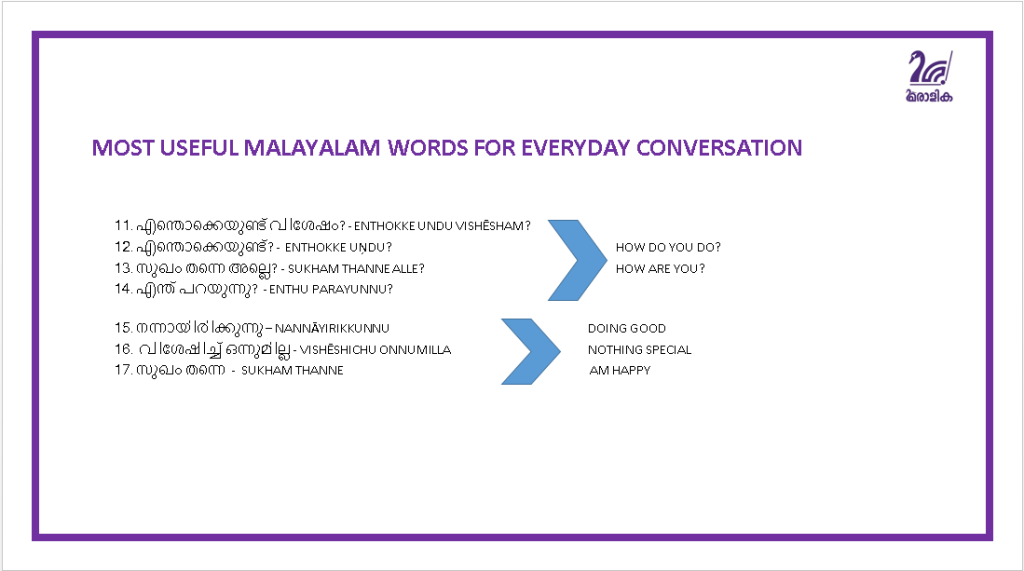
- ശരിയാണ്- SHARIYĀŅU
- അത് ശരി – ATHU SHARI
- അതെയതെ – ATHEYATHE
- അതെ – ATHE
- അതുതന്നെ – ATHU THANNE
- അങ്ങനെ തന്നെ – ANGANE THANNE
All these can be heard often in the middle of a conversation. Meaning of these in English is similar to, YES, YES IT IS, IT IS LIKE THAT, CORRECT, THAT IS CORRECT etc. These words can also be used in a conversation to show that, YES, I AM LISTENING, YOU HAVE MY ATTENTION etc.
- അതെല്ലേ?,- ATHE LLĒ,
- ആണല്ലേ? – AAŅALLE
- ആണോ? – AAŅO
- അതെയോ? – ATHEYŌ These are similar to IS IT? RIGHT NO? IS IT SO? ISN’T IT etc. in English? These again can be used to express our interest in the conversation.

- സന്തോഷം – SANTHŌSHAM
- പരിചയപ്പെട്ടതിൽ സന്തോഷം – PARICHAYAPPETTATHIL SANTHŌSHAM
- കണ്ടതിൽ സന്തോഷം – KANDATHIL SANTHOSHAM
- കാണാൻ കഴിഞ്ഞതിൽ സന്തോഷം – KĂŅĀN KAŹĤIÑĴATHIL SANTHŌSHAM…..
These are to express our happiness in meeting someone. Meaning in English can be PLEASURE, PLEASURE TO SEE YOU, HAPPY TO MEET YOU etc.
- വലിയ ഉപകാരം – VALIYA UPAKĀRAM
- വലിയ സഹായം – VALIYA SAHĀYAM
- ഈ ഉപകാരം ഒരിക്കലും മറക്കില്ല – Ē UPAKĀRAM ORIKKALUM MARAKKILLA These words are used to express your gratitude after receiving some help from others. These re informal, sweet as well as polite.

- ഞാൻ ചെയ്യാം – ÑĴĀN CHEYYAM
- എനിക്ക് ചെയ്യാൻ പറ്റും – ENIKKU CHEYYAN PAȚȚUM
- ഞാൻ ചെയ്തോളാം – ŅĴĀN CHEYTŌĻĀM
- ഒരു ബുദ്ധിമുട്ടും ഇല്ല – ORU BUDDHIMUTTUMILLA
- ഇത് ഒരു ചെറിയ പണിയല്ലേ – ITHU ORU CHERIYA PAŅIYALLE
- ഇത് എളുപ്പമാണ്, വേഗം കഴിയും – ITHU EĻUPPAMĀNU, VEGAM KAŽĤIYUM. These words are used to say that i am able to do it, I will do it etc., The meaning in English can be I CAN DO IT, IT IS EASY, IT IS NOT DIFFICULT, THIS IS A SMALL JOB etc.
- ഇത് എനിക്ക് ആവില്ല – ITHU ENIKKU ĀVILLA
- ഇത് എനിക്ക് ചെയ്യാൻ ബുദ്ധിമുട്ടാണ്- ITHU ENIKKU CHEYYĀN BUDHIMUTTĀŅU
- ഇത് എനിക്ക് ചെയ്യാൻ പറ്റില്ല – ITHU ENIKKU CHEYYAN PAȚȚILLA
- ഇത് കുറച്ചു കഷ്ടമാണ് – – ITHU KURACHU KASHTAMAŅU
- ഇത് അത്ര എളുപ്പമല്ല -, ITHU ATHRA EĻUPPAMALLA
These are different ways to say that I cannot do it. Meaning can be I CANNOT DO THIS, I WON’T BE ABLE TO DO THIS, THIS IS DIFFICULT, THIS IS NOT EASY etc. These are directly and openly denying something or someone, so be cautious about it.

- ദയവായി – DAYAVĀYI,
- ദയവ് ചെയ്ത് – DAYAVU CHEYTHU KINDLY AND PLEASE are similar English words. We can use these while requesting something to someone.
- ക്ഷമിക്കൂ – KSHAMIKKŪ
- എന്നോട് ക്ഷമിക്കൂ – ENNŌDU KSHAMIKKŪ
- എനിക്ക് മാപ്പ് തരൂ – ENIKKU MĀPPU THARŪ
- ദയവായി ക്ഷമിക്കൂ – DAYAVĀYI KSAMIKKŪ,
if we want to apologize we should remember these words. These can be translated as, PLEASE FORGIVE, PARDON ME, KINDLY FORGIVE etc.
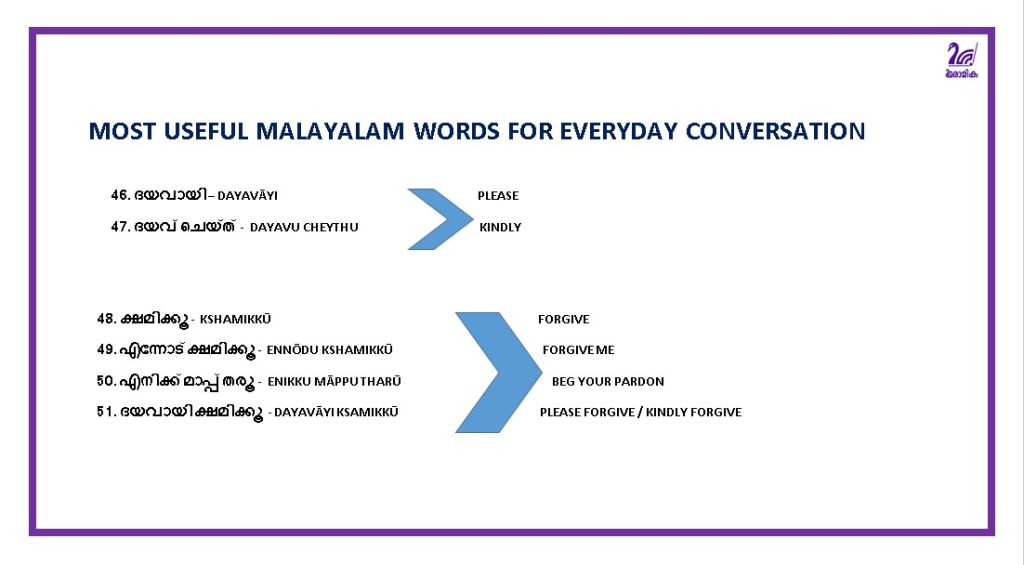
- സാരമില്ല, – SĀRAMILLA,
- പോട്ടെ സാരമില്ല – POTTE, SĀRAMILLA,
- അത് വിട്ടേയ്ക്കൂ – ATHU VITTĒYKKU
- അത് കാര്യമാക്കണ്ട – ATHU KARYAMĀKKAŅDA,
- ഒട്ടും കാര്യമാക്കണ്ട – OTTUM KARYAMĀKKAŅDA,
If someone did something wrong to you and they acknowledge their mistake and asking for forgiveness, we can say these as reply, if we are willing to forgive. Meaning in English can be LET IT GO, IT DOESN’T MATTER, NOTHING TO WORRY, NOT WORRY AT ALL etc. Another occasion to use these expressions can be, suppose if someone shares some bad experiences or their sorrows or worries, we can pacify them with these words.
- ഇനി ആവർത്തിക്കരുത് – INI AAVARTHIKKARUTHU
- ഇത്തവണത്തേക്ക് ക്ഷമിച്ചു – ITHAVAŅATHEKKU KSHAMICHU
- ഇത് ഒരിക്കലും ആവർത്തിക്കരുത് – ITHU ORIKKALUM AAVARTHIKKARUTHU These are warnings. Meaning can be DON’T REPEAT, NEVER REPEAT THIS, FORGIVING THIS TIME ONLY etc.

- ഇത് തെറ്റാണ് – ITHU THEȚȚĀŅU
- മഹാമോശം – MAHĀMŌṢAM
- ഇങ്ങനെ ചെയ്യരുത് – INGANE CHEYYARUTHU
- ഇത് ഒട്ടും ശരിയായില്ല – ITHU OTTUM ṢARIYĀYILLA
- ഇതിന് ഞാൻ കൂട്ടുനിൽക്കില്ല – ITHINU NJAN KŪTTU NILKKILLA
- ഞാൻ സമ്മതിക്കില്ല – NJAN SAMMATHIKKILLA
- എനിക്ക് ഇഷ്ടമല്ല – ENIKKU ISHTAMALLA
If we want to express our disagreement to someone or something, these are different expressions for various situations. English translations can be THIS IS WRONG, TOO BAD, THIS IS NOT AT ALL RIGHT, I WILL NOT AGREE, I DON’T LIKE IT, DON’T DO THIS, DON’T DO LIKE THIS, I WILL NOT BE A PART OF THIS, etc. These re direct and openly criticizing in nature, so be mindful while using it.

- ഒരു തെറ്റ് പറ്റി – ORU THEȚȚU PAȚȚI
- അറിയാതെ പറ്റിയതാണ് – ARIYATHE PAȚȚIYATHÁŅU
- അബദ്ധം പറ്റിയതാണ് – ABADDHAM PAțțIYATHAŅU,
- വേണമെന്ന് വിചാരിച്ചു ചെയ്തതല്ല – VĒŅAM ENNU VICHARICHU CHEYTHATHALLA
- മനപ്പൂർവമല്ല – MANAPPURVAMALLA.
These are different ways to acknowledge our mistakes. Meaning can be, MADE A MISTAKE IT WAS NOT INTENTIONAL, IT WAS A MISTAKE, etc.

- നന്നായിരിക്കൂ – NANNĀYIRIKKŪ
- നന്നായി വരട്ടെ – NANNĀYI VARATTE
- നല്ലത് വരട്ടെ – NALLATHU VARATTE
- ഈശ്വരൻ അനുഗ്രഹിക്കട്ടെ – EESHWARAN ANUGRAHIKKATTE
- എല്ലാ സന്തോഷവും കിട്ടട്ടെ – ELLA SANTHOSHAVUM KITTATTE
- സന്തോഷമായിരിക്കൂ – SANTHOSHAMAYIRIKKU
- എല്ലാ നന്മകളും നേരുന്നു – ELLA NANMAKALUM NERUNNU
These are the words to convey our blessings and good wishes to others. Can be translated to English as BE GOOD, BE HAPPY, GOD BLESS, ALL THE BEST, etc.
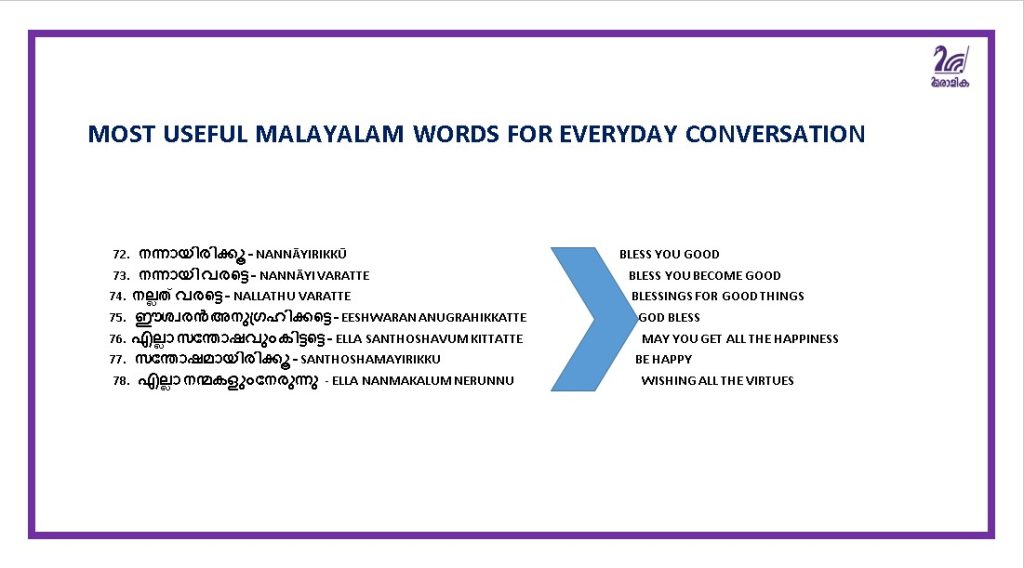
- കാണാം – KĀŅĀM
- പിന്നെ വരാം – PINNE VARĀM
- പോയിട്ട് വരാം – POYITTU VARĀM
- പിന്നെ കാണാം – PINNE KĀŅĀM
- ഇറങ്ങട്ടെ – IRANGATTE
- വരട്ടെ – VEEŅDUM KĀŅĀAM
- വീണ്ടും വരാം – VEEŅDUM VARĀM
- ഇനിയും വരാം – INIYUM VARĀM
These are similar to BYE, GOODBYE, in English language. When we are leaving the guest’s home after a visit, we can say these words. These can be translated as WILL MEET AGAIN, WILL COME AGAIN, AM LEAVING, etc.

- പോയി വരൂ – POYI VARUU
- വീണ്ടും വരണേ – VEEŅDUM VARAŅĒ
- ഇടയ്ക്കൊക്കെ വന്നിട്ട് പോകൂ – IDAYKKOKKE VANNITTU POKŪ
- ഇടയ്ക്കൊക്കെ വരണേ – IDAYKKOKKE VARAŅĒ
When our guests are leaving after visiting us, we can say these to them. This can be loosely translated as COME AGAIN, VISIT WHENEVER POSIBLE, etc.
- ഇത് തന്നെ ധാരാളം – ITHU THANNE DHARAļAM
- ഇത് തന്നെ ആവശ്യത്തിൽ കൂടുതലാണ് – ITHU THANNE AAVASHYATHIL KUDUTHALĀŅU
- ഇപ്പോൾത്തന്നെ ഒരുപാട് ഉണ്ട് – IPPOļTHTHANNE ORUPADU UNDU
- വേണമെന്നില്ല – VEŅAM ENNILLA,
If anyone offers you something more, like to have more food, and you don’t prefer, then you can respond by saying these. Meaning for these in English can be roughly, I HAVE MORE THAN ENOUGH, THIS ITSELF IS PLENTY, THIS ITSELF IS MORE etc.
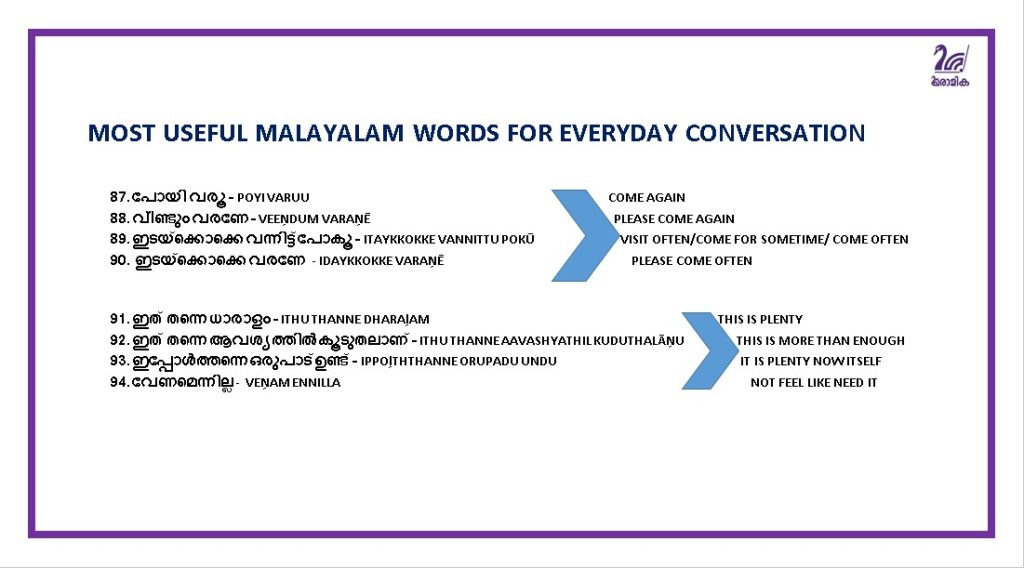
- നന്നായിട്ടുണ്ട് – NNNĀYITTUŅDU
- വളരെ നന്നായിട്ടുണ്ട് – VAļARE NANNĀYITTUNDU
- ഗംഭീരം – GAMBHEERAM
- അതിഗംഭീരം – ATHI GAMBHEERAM
- ഉഗ്രൻ – UGRAN
- അത്യുഗ്രൻ – ATHYUGRAN,
These are how we appreciate a performance, art or anything in general too. Meaning can be, IT IS GOOD, VERY GOOD, AWESOME, SPLENDIND, EXCELLENT etc.
- നന്ദി – NANNI
- ഹൃദയം നിറഞ്ഞ നന്ദി – HRUDAYAM NIRAÑĴA NANNI
- എല്ലാവർക്കും നന്ദി – ELLAVARKKUM NANNI
- അകമഴിഞ്ഞ നന്ദി – AKAMaŹĤIÑĴA NANNI
- ഒരായിരം നന്ദി – ORAYIRAM NANNI
All these are the ways to express gratitude formally. The loose translation in English can be THANKS, HEARTFELT GRATITUDE, THANKS TO ALL, etc. We can often hear these at the end of a formal gathering or a meeting.

CONCLUSION
The above list is a great resource for a learner. Even though it does not include each and every word used daily and some of the English translation is doesn’t give the literal meaning of the translated word or phrase it can be really helpful while taking part in a conversation. Remember to practice by reading out repeatedly, memorising and listening. Listen to podcasts, watch videos and movies and try to recognize the above list of words and phrases and try to pick up new words used in similar situations mentioned above. It is an enjoyable way to learn nuances of conversational form of language.
Gradually our knowledge horizon gets wider and we acquire great amount of confidence, not only in our proficiency in Malayalam but also as a human being.
Looking back, we can now understand how incredible the journey is, the challenges we overcame, the doubts that got cleared, the help and support that we received, the hard work that we put in, the zeal and diligence that we displayed everything lead us to this level of progress. At this stage the language reveals its beauty and wisdom to our consciousness. The language started its flow to our heart, thoughts and mind.
The great philosopher Confucius said: “It doesn’t matter how slowly you go as long as you don’t stop”
So keep the spirit high, until we master the language.
Be Engaged In Learning
For Online Malayalam classes Visit https://www.maralika.org/
Registration link for students https://www.maralika.org/register
